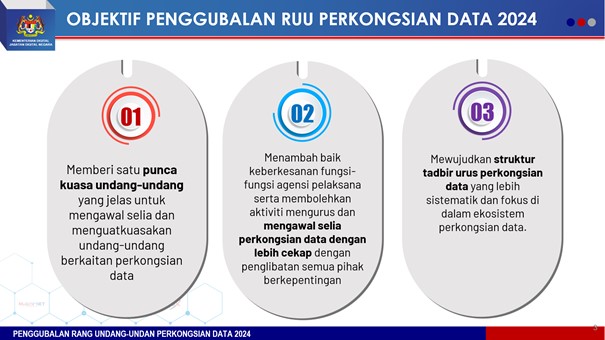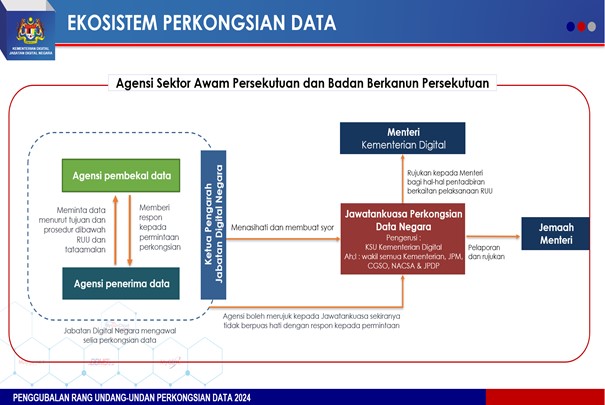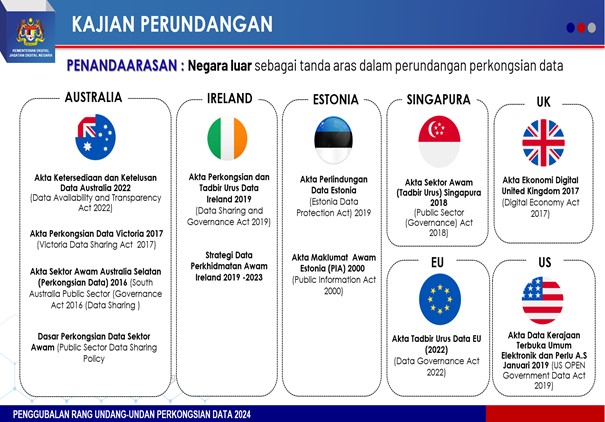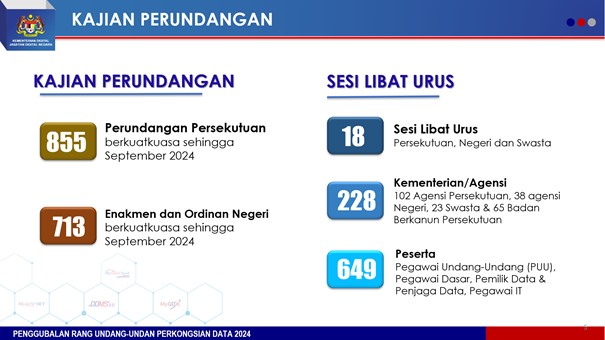Intention of Drafting the Bill
In this regard, to intensify the digitalisation of Government service delivery and policy making more effectively, JDN has drafted a new Bill on the sharing of data under the control of a public sector agency with other public sector agencies known as the Data Sharing Bill 2024 (Data Sharing Bill 2024) with the following objectives:

Figure 2: Objectives of the Data Sharing Bill 2024
The main intention of the Data Sharing Bill 2024 is to create a more efficient governance ecosystem, ensure data security and privacy and increase the efficiency of digitalization in the transparent delivery of public services to the people . In today’s digital era, it is certain that effective data management and sharing is essential for the smooth operation of Government services and functions.

Figure 3: Ecosystem of the Data Sharing Bill 2024
Effective use of data enables policymakers to gain better insights into specific issues and subsequently identify comprehensive solutions. Public sector data assumes a crucial role in supporting the service delivery of various government agencies, provided that data sharing is carried out optimally.
The challenges and concerns currently associated with data sharing are related to data privacy, security risks of data use, lack of standardisation of data formats and storage, no legislation on data sharing that supports current policies on data sharing, lack of trust in the data sharing ecosystem between stakeholders, and unclear data quality as well as accuracy.
The enactment of the Data Sharing Bill 2024 is a solution to address the legal constraints in data sharing that will enable the smooth implementation of public sector data sharing. The Data Sharing Bill 2024 also gives balanced consideration to the need to protect certain data for national security reasons, public interest or other reasons that do not justify the sharing of the data.
Given the importance of this data sharing, JDN has conducted a legal study over a period of one year from 2 October 2023 to 1 October 2024. The legal study was conducted on 852 Acts currently in force; 713 state enactments and ordinances currently in force in 13 states in Malaysia based on the LawNet database; and a benchmarking study involving the European Union (EU), United Kingdom (UK), United States (US), Australia, Republic of Singapore, Republic of Ireland and Republic of Estonia.

Figure 4: Benchmarking with Foreign Countries
Engagement sessions involving all ministries and state government secretaries were held to obtain feedback, views and suggestions from the agencies that own the legislation in force for the drafting of the 2024 Data Sharing Bill. Until the end of October 2024, 18 engagement sessions involving 228 ministries, federal agencies and state agencies as well as 23 company representatives had been held.
This engagement session discussed and proposed several key policy matters and principles that need to be taken into account in the drafting of the 2024 Data Sharing Bill.

Figure 5: Management Engagement Session Achievements
In this context, the drafting of the Data Sharing Bill 2024 is the first legislation that emphasises the importance of data, governance mechanisms to facilitate the data sharing process and focuses the security of shared data as well as actions that can be taken against certain parties who violate the provisions under this Bill.
National Digital Department
Levels 1-6,
MKN Embassy Techzone Building
Block B, No. 3200
Jalan Teknokrat 2
63000 Cyberjaya, Sepang
Selangor Darul Ehsan
Tel: 603-8000 8000
Email: webmasterjdn@jdn.gov.my
Today’s Visitors: 84
Number of Visitors: 115853
Total Reach: 937623
This site is best viewed using the latest version of Microsoft Edge & Google Chrome web browsers with a minimum resolution of 1366×768.